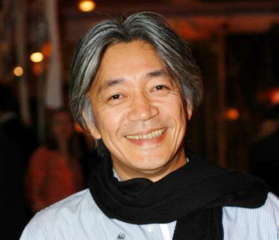Difference between revisions of "Ryuichi Sakamoto"
From Sega Retro
m (minor cleanup) |
m (Text replacement - " Category:Outside Composers" to "") |
||
| Line 33: | Line 33: | ||
<references/> | <references/> | ||
| − | |||
[[Category:Celebrities]] | [[Category:Celebrities]] | ||
Latest revision as of 07:06, 22 February 2024

|
| Ryuichi Sakamoto |
|---|
| Place of birth: Tokyo, Japan |
| Date of birth: 1952-01-17 |
| Date of death: 2023-03-28[1] (age 71) |
| Employment history: |
| Role(s): Musician, Composer, Singer |
| Education: Tokyo National University of Fine Arts and Music (Master Electronic and Ethnic Music, BA Music Composition) |
| Twitter: @ryuichisakamoto |
This short article is in need of work. You can help Sega Retro by adding to it.
Ryuichi Sakamoto (坂本龍) was a renowned and highly-influential Japanese musician. A founder of pioneering electronic music group Yellow Magic Orchestra, Sakamoto's early incorporation of electronic sounds into popular music helped inspire a number of future Sega talent to make their way into computer-focused industries (such as Yuji Naka and Kenji Eno), and is most known among the modern gaming community for composing the Sega Dreamcast startup jingle.
Career
Sometime in the late 1990's, game developer and fellow musician Kenji Eno approached Sakamoto to compose the upcoming Dreamcast's start-up jingle. To Eno's pleasant surprise, the offer was accepted rather quickly.[3] Sakamoto's start-up jingle would go on to become one of the system's most fondly-remembered features.
Sakamoto was significantly involved in the production of the November 2000 Sega Dreamcast role-playing game L.O.L.[2], composing and performing the entirety of its soundtrack.
Production history
Hardware
- Sega Dreamcast (Dreamcast; 1998) — Start-up Jingle
External links
- Official website
- Ryuichi Sakamoto at Discogs
- Hearing the Love: Ryuichi Sakamoto article by Gregory Oborne at It's Still Thinking
References
- ↑ @ryuichisakamoto on Twitter (Wayback Machine: 2023-04-02 12:44)
- ↑ 2.0 2.1 2.2 File:LOL DC JP Box Back.jpg
- ↑ JW Szczepaniak (2014). The Untold History of Japanese Game Developers: Volume 1